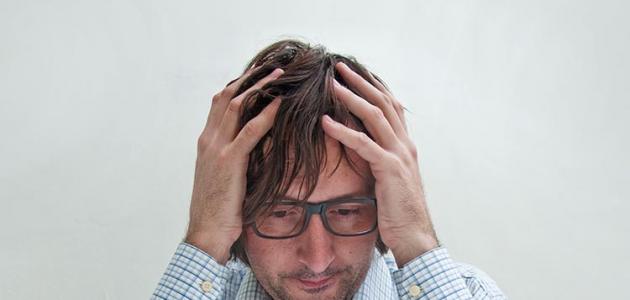Contents
Overview
Depression, major depressive disorder, or clinical depression are all terms used to describe a severe disturbance in a person's mood that is related to many symptoms affecting their thinking, feelings, and performance of daily activities, such as: work, sleep, and eating , [1] It is important to address the fact that there is a difference between sadness and depression; Sadness is a natural feeling that everyone goes through during the difficult times of their lives, and crying and talking to others may contribute to relieving sadness and feeling comfortable, and like other feelings, it usually disappears with the passage of time and the person returns to practice his life normally, which is different from depression that continues For a long time, it negatively affects a person’s professional and professional life and changes his personality and behavior. Depression is one of the mental disorders whose symptoms last for a long time if not treated, and in this context it should be noted that the feeling of sadness and the inability to practice daily life normally as before for a longer period Two weeks may be a symptom of depression, and therefore it is appropriate for the individual to see a specialist doctor. [2] [3]
To learn more about depression, read the following article: ( What is depression ) .
According to the World Health Organization , the number of people suffering from depression around the world is estimated at 322 million people, and the percentage of depression in the world in 2015 was estimated at approximately 4.4%, and these statistics also indicated that depression is more common. Among women compared to men, where the incidence of depression in women is estimated at approximately 5.1%, while it is estimated at 3.6% in men, and the World Health Organization has indicated that the prevalence of depression varies with age, as it affects children and adolescents under the age of 15 years. To a lesser degree than in older people, as it is more common in older adults aged 55-74 years, with an estimated rate of more than 7.5% in women, and more than 5.5% in men. [4]And it should be clarified that it is possible to control depression even severe cases, especially if the patient receives treatment early, as its effectiveness increases at that time, and among the treatment options available for depression are drugs and psychotherapy, so that one or both of them can be used to treat the patient. These are known as antidepressants and are used to relieve symptoms of depression [1]These include selective serotonin reuptake inhibitors, and serotonin-norepinephrine reuptake inhibitors (SNRIs), and your doctor may sometimes prescribe other drugs in addition to these drugs to enhance their effect, such as anti-anxiety drugs . Anti-anxiety), and as for psychological treatment, it consists in seeing a specialist psychiatrist and talking to him about depression and other problems related to it, so that the doctor can provide assistance and treat depression. [5]
To learn more about depression treatment, read the following article: ( Methods for treating mental depression ) .
Causes of depression
In fact, the direct underlying cause of depression is still not completely clear until now, but there are many factors and causes that may play a role in its emergence, and in this context it is indicated that sometimes symptoms of depression may be triggered by the presence of more than one factor together. At the same time, [6] and this is precisely what makes it a very complex disease, and in what follows we detail the most important factors that increase an individual's risk of depression. [7]
Disruption of brain chemistry
The disorder balance of neurotransmitters responsible for regulating the mood of the person, specifically dopamine and serotonin and norepinephrine , one of the possible causes of depression, [8] The statement of the most important assumptions related to levels of these vectors comes And its impact on the occurrence of depression, and among these hypotheses we mention the following: [9]
- The biogenic amine hypothesis: This hypothesis states that low levels of the neurotransmitters norepinephrine, serotonin and dopamine may cause depression.
- Hypothesis of altered sensitivity of the receptor after synapses: which indicates that the desensitization of norepinephrine or serotonin receptors may be related to the onset of antidepressant effects.
- Dysregulation hypothesis: This hypothesis states that the cause of depression is a failure of stable control of the neurotransmitter system and not a decrease or increase in the activity of neurotransmitters.
- Hypothesis related to the link between serotonin receptors and norepinephrine: This hypothesis states that the activity of both serotonin and norepinephrine receptors is linked, and that their systems play a role in the antidepressant response.
Family history and genetics
Genetic factors may contribute to an increased risk of depression, given that depression may spread among members of the same family, but a first-degree relative has depression. As a parent, it does not necessarily mean that a person will have depression. As the personal factors and other life circumstances may have a significant impact in contributing to the increased risk of depression, it is likely that these factors with genetic factors combine so that all increase together risk of individual depression, [10] [11] In fact believed that depression The genetic aspect is a complex disease, in other words that many different genes may contribute to depression, not just one gene, [7]It is worth noting that Frontiers in Psychiatry published an analytical study in 2018, after conducting it on families and twins, which showed that the risk of depression increases by two to three times for children - the first generation of offspring - if one of the parents was depressed, as these showed A study shows that the inheritance rate for depression may reach 37%. [12]
Tension and stress
Stress and stress from various life stressors, including financial and marital problems, increase the risk of developing depression. It has been found that stress stimulates the production of greater amounts of cortisol in the body, which is believed to have a fundamental effect on the ability to coordinate thoughts and behaviors, and emotional and involuntary reactions, as well as the concentration of some neurotransmitters in different parts of the brain, in addition to its effect on the physical health of the individual. Here, the body returns to what it was before if the stress and tension lasted for a short time, but if the stress was chronic, then these brain and physical changes may last for very long periods. [13]
Childhood trauma
Exposure to emotional and psychological trauma during childhood, such as the death of parents, or exposure to physical or sexual abuse, has been found to increase the risk of developing depression in later life stages. Researchers believe that early trauma is associated with slight changes in brain function that are responsible for the symptoms of depression and anxiety . Changes may include fluctuations in the concentrations of neurotransmitters or damage to nerve cells, but studies are still in place to clarify the relationship between trauma, depression and the brain. So far. [14] [13]
Use of medication and alcohol
In fact, the relationship between taking certain drugs or alcohol and depression is reciprocal. In other words, addiction to alcohol and some drugs may lead to depression or worsen its symptoms, and depression may lead to addiction to some drugs and alcohol, and in general it is recommended to refrain from taking any drug sold by prescription without consulting a specialist doctor, and it is not allowed to stop taking any medicine Without consulting a specialist doctor; The doctor is able to determine the desired benefits versus the potential side effects, and decides whether or not the person should continue to take the drug accordingly. [15] [11]
Being seriously ill
Mental health is clearly linked to a person's physical health. This relationship is reflected in the incidence of depression in two ways, the first is that stress caused by chronic diseases, such as coronary heart disease and cancer, may stimulate severe depression for a period, and the second is that some physical diseases are associated with the emergence of some symptoms of depression or causing For depression; For example, hypothyroidism resulting from an immune system disorder or damage to the pituitary gland may lead to feelings of extreme fatigue and lack of sexual desire, which in turn increases the chance of depression, as well as exposure to head injury may trigger some symptoms of depression Like emotional turmoil and mood swings. [15] [8]
Other factors
There are other factors that may also contribute to an increased risk of a person developing depression, and they include the following: [15] [11]
- The personality of the individual: The individual's personality with some characteristics, such as: the tendency to feel greatly anxious, low self-confidence, the pursuit of perfection in all actions, the feeling of negativity and self-flagellation above the normal limit, and sensitivity to criticism may increase the risk of depression, and this may be attributed to this. Due to lack of experience with life, or the inheritance of some genes from one or both parents.
- Loneliness: Being cut off from and from family and friends increases the risk of depression.
- Hormonal changes: Hormonal fluctuations that a female goes through during menstruation, menopause , or childbirth may increase her chances of becoming depressed, and in this context it is indicated that postpartum depression may be associated with a rapid change in hormone levels. Which begins immediately after birth, and it is worth noting that the risk of depression decreases after menopause. [8]
Tips for dealing with depression
As mentioned previously, depression is a disease that can be treated with medication and psychotherapy. [5] In addition to these treatments, the following advice can be used to deal with depressive episodes: [16] [17]
- Divide meals into several small meals, and be careful as much as possible not to skip eating any meal, because not eating for a long time causes a feeling of irritability and fatigue, which worsens the symptoms of depression.
- Avoid eating too many foods rich in carbohydrates and sugar. These foods have been found to be linked to rapid mood changes and low energy.
- Avoid a lot of beverages containing caffeine and foods containing preservatives and trans fats.
- Avoid drinking alcohol.
- Exposure to the sun for about 15 minutes during the day; The sun's rays may enhance the secretion of serotonin, which in turn improves your mood.
- Exercise aerobic exercise regularly, such as walking, swimming, and lifting weights.
- Practice relaxation exercises, such as yoga, meditation, and deep breathing.
- Manage stress.
- Stay in touch with others and engage in various social activities.
- Practice favorite hobbies and activities.
- Make sure to sleep for at least 8 hours of enough sleep.
- Make sure to go to bed and wake up at the same time every day, and avoid taking naps during the day.
- Accept the disease and focus on the fact that it can be overcome and cured.
- Focus on positive thoughts and avoid negative thoughts.
- Keeping a diary to record daily events; In order to identify the triggers for depression and try to avoid or control them, and in this context it is indicated that it is good for a depressed person to record the positive events that he goes through during the day in this diary, as this would build the patient's self-confidence again.
References
- ^ A b "Depression" , Www.nimh.nih.gov , Retrieved 27-11-2019. Edited.
- ↑ "Is It Depression or Sadness? Learn the Signs" , www.healthline.com , 11-14-2016, Retrieved 2-12-2019. Edited.
- ↑ "The difference between depression and sadness" , www.medicalnewstoday.com , 22-11-2019, Retrieved 2-12-2019.
- ↑ "Depression and Other Common Mental Disorders Global Health Estimates" , apps.who.int , Retrieved 28-11-2019. Edited.
- ^ A b "Depression" , Www.mayoclinic.org , Retrieved 28-11-2019. Edited.
- ↑ "What is depression and what can I do about it?" , www.medicalnewstoday.com , Retrieved 28-11-2019. Edited.
- ^ A b "Causes Of Depression" , the www.webmd.com , Retrieved 28-11-2019. Edited.
- ^ A b T "Causes And Risk Factors Of Depression" , Www.verywellmind.com , Retrieved 30-11-2019. Edited.
- ↑ Barbara G. Wells, Terry L. Schwinghammer, Joseph T. DiPiro * Cecily V. DiPiro (2017), Pharmacotherapy Handbook, Tenth Edition , United States of America: McGraw-Hill Education, Page 855, Part 13. Edited.
- ↑ "Depression" , ghr.nlm.nih.gov , Retrieved 4-12-2019. Edited.
- ^ A b v "What causes depression?" , www.beyondblue.org.au , Retrieved 2-12-2019. Edited.
- ↑ "Genetics Factors in Major Depression Disease" , www.ncbi.nlm.nih.gov , Retrieved November 28 , 2019 . Edited.
- ^ A b "What causes depression?" , www.health.harvard.edu , Retrieved 1-12-2019. Edited.
- ↑ "Childhood Trauma: What Role Does It Play in Depression?" , www.bbrfoundation.org , Retrieved 4-12-2019. Edited.
- ^ A b v "Causes -Clinical Depression" , Www.nhs.uk , Retrieved 2-12-2019. Edited.
- ↑ "Coping with Depression" , www.helpguide.org , 1-10-2019, Retrieved 1-12-2019. Edited.
- ↑ "How to cope with a depressive episode" , www.medicalnewstoday.com , Retrieved 1-12-2019. Edited.








